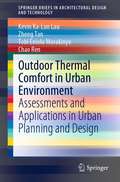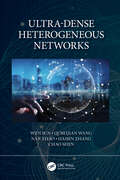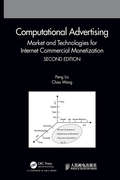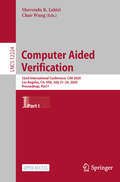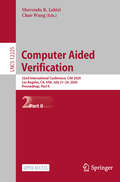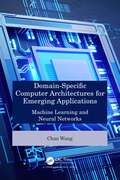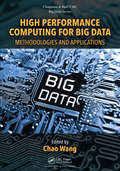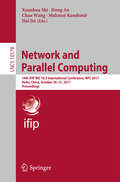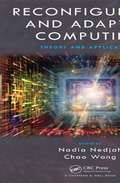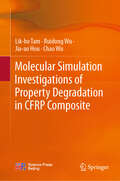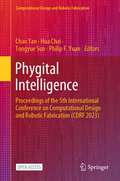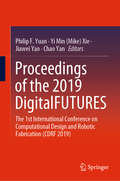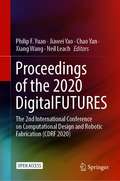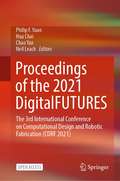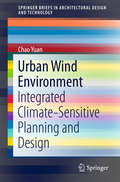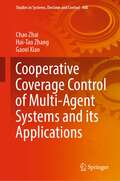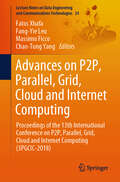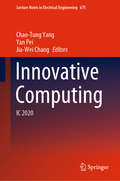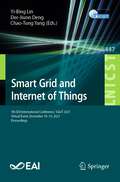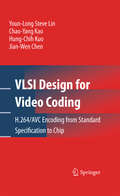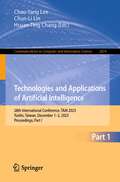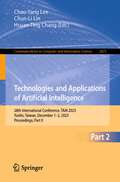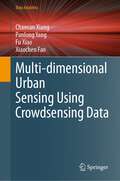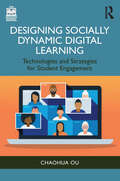- Table View
- List View
Outdoor Thermal Comfort in Urban Environment: Assessments and Applications in Urban Planning and Design (SpringerBriefs in Architectural Design and Technology)
by Chao Ren Kevin Ka-Lun Lau Zheng Tan Tobi Eniolu MorakinyoThis book highlights the importance of outdoor thermal comfort for improving urban living quality in the context of urban planning and urban geometry design. It introduces readers to a range of assessment methods and applications of outdoor thermal comfort and addresses urban geometry and thermal environment at the neighbourhood scale using real-world examples and parametric studies. In addition, the subjective evaluations by urban dwellers and numerical modelling tools introduced in this book provide not only a comprehensive assessment of outdoor thermal comfort but also an integrated approach to using thermal comfort indicators as a standard in high-density cities. Given its scope, the book offers a valuable guide for urban climate researchers, urban planners, and designers, and policymakers pursuing more liveable urban environments.
Ultra-Dense Heterogeneous Networks
by Chao Shen Wen Sun Haibin Zhang Nan Zhao Lawrence Wai-Choong WongDriven by the ever-increasing amount of mobile data, cellular networks evolve from small cell network to ultra-dense heterogeneous networks, to provide high system capacity and spectrum efficiency. By bringing base stations (BSs) to the approximate spatial scale and number magnitude, ultra-dense heterogeneous networks would definitely bring unprecedented paradigm changes to the network design. Firstly, along with densification of small cells, inter-cell interference becomes severe and may deteriorate performance of mobile users. Assigning network resources including bandwidth and time slots, while avoiding interference, desires serious consideration. Secondly, the coverage area of BSs becomes small and irregular, resulting in much frequent and complicated handovers when mobile users move around. How to ensure continuous communication and implement effective mobility management, and inter-cell resource allocation and cooperation, remains a challenging issue. Thirdly, such dynamic change in spatial dimension enables us to re-investigate available and ongoing communications and networking techniques, such as massive MIMO, CoMP, millimeter waves (mmWaves), carrier aggregation, full duplex radio, and D2D communications. To address the aforementioned challenging research issues, this book will investigate the service and QoE provisioning in ultra-dense heterogeneous networks. In particular, firstly we introduce ultra-dense heterogeneous networks by careful definition regarding spatial deployment, generic characteristics, and requirements of ultra-dense heterogeneous networks in order to ensure QoE of mobile users. Secondly, we depict the resource management among small cells in close proximity, mobility management for mobile users (address the super-frequent handovers), and interference management (dealing with the interference due to frequency-reuse in the vicinity). Thirdly, we study the enabling factors, and the integration of ultra-dense heterogeneous networks with enabling technologies, such as massive-MIMO, cloud-RAN, mmWaves, D2D, IoT. Finally, we conclude the book and indicate future directions and challenges.
Computational Advertising: Market and Technologies for Internet Commercial Monetization
by Peng Liu Chao WangThis book introduces computational advertising, and Internet monetization. It provides a macroscopic understanding of how consumer products in the Internet era push user experience and monetization to the limit. Part One of the book focuses on the basic problems and background knowledge of online advertising. Part Two targets the product, operations, and sales staff, as well as high-level decision makers of the Internet products. It explains the market structure, trading models, and the main products in computational advertising. Part Three targets systems, algorithms, and architects, and focuses on the key technical challenges of different advertising products. Features · Introduces computational advertising and Internet monetization · Covers data processing, utilization, and trading · Uses business logic as the driving force to explain online advertising products and technology advancement · Explores the products and the technologies of computational advertising, to provide insights on the realization of personalization systems, constrained optimization, data monetization and trading, and other practical industry problems · Includes case studies and code snippets
Computer Aided Verification: 32nd International Conference, CAV 2020, Los Angeles, CA, USA, July 21–24, 2020, Proceedings, Part I (Lecture Notes in Computer Science #12224)
by Chao Wang Shuvendu K. LahiriThe open access two-volume set LNCS 12224 and 12225 constitutes the refereed proceedings of the 32st International Conference on Computer Aided Verification, CAV 2020, held in Los Angeles, CA, USA, in July 2020.* The 43 full papers presented together with 18 tool papers and 4 case studies, were carefully reviewed and selected from 240 submissions. The papers were organized in the following topical sections: Part I: AI verification; blockchain and Security; Concurrency; hardware verification and decision procedures; and hybrid and dynamic systems. Part II: model checking; software verification; stochastic systems; and synthesis. *The conference was held virtually due to the COVID-19 pandemic.
Computer Aided Verification: 32nd International Conference, CAV 2020, Los Angeles, CA, USA, July 21–24, 2020, Proceedings, Part II (Lecture Notes in Computer Science #12225)
by Chao Wang Shuvendu K. LahiriThe open access two-volume set LNCS 12224 and 12225 constitutes the refereed proceedings of the 32st International Conference on Computer Aided Verification, CAV 2020, held in Los Angeles, CA, USA, in July 2020.* The 43 full papers presented together with 18 tool papers and 4 case studies, were carefully reviewed and selected from 240 submissions. The papers were organized in the following topical sections: Part I: AI verification; blockchain and Security; Concurrency; hardware verification and decision procedures; and hybrid and dynamic systems.Part II: model checking; software verification; stochastic systems; and synthesis. *The conference was held virtually due to the COVID-19 pandemic.
Domain-Specific Computer Architectures for Emerging Applications: Machine Learning and Neural Networks
by Chao WangWith the end of Moore’s Law, domain-specific architecture (DSA) has become a crucial mode of implementing future computing architectures. This book discusses the system-level design methodology of DSAs and their applications, providing a unified design process that guarantees functionality, performance, energy efficiency, and real-time responsiveness for the target application.DSAs often start from domain-specific algorithms or applications, analyzing the characteristics of algorithmic applications, such as computation, memory access, and communication, and proposing the heterogeneous accelerator architecture suitable for that particular application. This book places particular focus on accelerator hardware platforms and distributed systems for various novel applications, such as machine learning, data mining, neural networks, and graph algorithms, and also covers RISC-V open-source instruction sets. It briefly describes the system design methodology based on DSAs and presents the latest research results in academia around domain-specific acceleration architectures.Providing cutting-edge discussion of big data and artificial intelligence scenarios in contemporary industry and typical DSA applications, this book appeals to industry professionals as well as academicians researching the future of computing in these areas.
High Performance Computing for Big Data: Methodologies and Applications (Chapman & Hall/CRC Big Data Series)
by Chao WangHigh-Performance Computing for Big Data: Methodologies and Applications explores emerging high-performance architectures for data-intensive applications, novel efficient analytical strategies to boost data processing, and cutting-edge applications in diverse fields, such as machine learning, life science, neural networks, and neuromorphic engineering. The book is organized into two main sections. The first section covers Big Data architectures, including cloud computing systems, and heterogeneous accelerators. It also covers emerging 3D IC design principles for memory architectures and devices. The second section of the book illustrates emerging and practical applications of Big Data across several domains, including bioinformatics, deep learning, and neuromorphic engineering. Features Covers a wide range of Big Data architectures, including distributed systems like Hadoop/Spark Includes accelerator-based approaches for big data applications such as GPU-based acceleration techniques, and hardware acceleration such as FPGA/CGRA/ASICs Presents emerging memory architectures and devices such as NVM, STT- RAM, 3D IC design principles Describes advanced algorithms for different big data application domains Illustrates novel analytics techniques for Big Data applications, scheduling, mapping, and partitioning methodologies Featuring contributions from leading experts, this book presents state-of-the-art research on the methodologies and applications of high-performance computing for big data applications. About the Editor Dr. Chao Wang is an Associate Professor in the School of Computer Science at the University of Science and Technology of China. He is the Associate Editor of ACM Transactions on Design Automations for Electronics Systems (TODAES), Applied Soft Computing, Microprocessors and Microsystems, IET Computers & Digital Techniques, and International Journal of Electronics. Dr. Chao Wang was the recipient of Youth Innovation Promotion Association, CAS, ACM China Rising Star Honorable Mention (2016), and best IP nomination of DATE 2015. He is now on the CCF Technical Committee on Computer Architecture, CCF Task Force on Formal Methods. He is a Senior Member of IEEE, Senior Member of CCF, and a Senior Member of ACM.
Network and Parallel Computing
by Hai Jin Xuanhua Shi Hong An Chao Wang Mahmut KandemirThis book constitutes the refereed proceedings of the IFIP International Conference on Network and Parallel Computing, NPC 2007. It covers network applications: cluster and grid computing, peer-to-peer computing; network technologies: network algorithms, network reliability and dependability; network and parallel architectures: multicore design issues, performance modeling and evaluation; and parallel and distributed software: data mining, parallel programming tools and compilers.
Reconfigurable and Adaptive Computing: Theory and Applications
by Nadia Nedjah Chao WangReconfigurable computing techniques and adaptive systems are some of the most promising architectures for microprocessors. Reconfigurable and Adaptive Computing: Theory and Applications explores the latest research activities on hardware architecture for reconfigurable and adaptive computing systems.The first section of the book covers reconfigurable systems. The book presents a software and hardware codesign flow for coarse-grained systems-on-chip, a video watermarking algorithm for the H.264 standard, a solution for regular expressions matching systems, and a novel field programmable gate array (FPGA)-based acceleration solution with MapReduce framework on multiple hardware accelerators.The second section discusses network-on-chip, including an implementation of a multiprocessor system-on-chip platform with shared memory access, end-to-end quality-of-service metrics modeling based on a multi-application environment in network-on-chip, and a 3D ant colony routing (3D-ACR) for network-on-chip with three different 3D topologies.The final section addresses the methodology of system codesign. The book introduces a new software–hardware codesign flow for embedded systems that models both processors and intellectual property cores as services. It also proposes an efficient algorithm for dependent task software–hardware codesign with the greedy partitioning and insert scheduling method (GPISM) by task graph.
Molecular Simulation Investigations of Property Degradation in CFRP Composite
by Chao Wu Lik-ho Tam Ruidong Wu Jia-ao HouThis book is written by a group of researchers based on the recent research progress in the fiber/matrix interface degradation under various environmental exposures via molecular dynamics simulation. It provides systematic framework of the model development, simulation techniques, and simulation results and presents the future research directions for investigating the interfacial degradation. By introducing the molecular details of fiber/matrix interface under environmental effects, it advances the fundamental understanding of the interfacial degradation mechanism. Researchers, scientists and engineers in the field of civil engineering and composite materials can benefit from the book. In conclusion, this book provides a computational paradigm and valuable insights on the fundamental interfacial degradation mechanism, which can contribute to the prediction of long-term behavior of fiber-reinforced polymer composites in harsh environments and pave the way for the material design with stronger interface.
Hybrid Intelligence: Proceedings of the 4th International Conference on Computational Design and Robotic Fabrication (CDRF 2022) (Computational Design and Robotic Fabrication)
by Philip F. Yuan Chao Yan Hua Chai Keke Li Tongyue SunThis open access book is a compilation of selected papers from DigitalFUTURES 2022—The 4th International Conference on Computational Design and Robotic Fabrication (CDRF 2022). The work focuses on novel techniques for computational design and robotic fabrication. The contents make valuable contributions to academic researchers, designers, and engineers in the industry. As well, readers encounter new ideas about intelligence in architecture.
Phygital Intelligence: Proceedings of the 5th International Conference on Computational Design and Robotic Fabrication (CDRF 2023) (Computational Design and Robotic Fabrication)
by Philip F. Yuan Chao Yan Hua Chai Tongyue SunThis open access book is a compilation of selected papers from 2023 DigitalFUTURES — The 5nd International Conference on Computational Design and Robotic Fabrication (CDRF 2023). The work focuses on novel techniques for computational design and robotic fabrication. The contents make valuable contributions to academic researchers, designers, and engineers in the industry. As well, readers will encounter new ideas about understanding intelligence in architecture.
Proceedings of the 2019 DigitalFUTURES: The 1st International Conference on Computational Design and Robotic Fabrication (CDRF 2019)
by Philip F. Yuan Yi Min Mike Xie Jiawei Yao Chao YanThe “2019 DigitalFUTURES — The 1st International Conference on Computational Design and Robotic Fabrication (CDRF 2019)” provides an international platform for advanced scientific research papers on the digital technology of architectural design and construction. The themes of the papers include, but are not limited to, architectural theories, tools, methods and procedures in material intelligence, data intelligence; computational intelligence, and robotic intelligence.
Proceedings of the 2020 DigitalFUTURES: The 2nd International Conference on Computational Design and Robotic Fabrication (CDRF 2020)
by Neil Leach Philip F. Yuan Jiawei Yao Chao Yan Xiang WangThis open access book is a compilation of selected papers from 2020 DigitalFUTURES—The 2nd International Conference on Computational Design and Robotic Fabrication (CDRF 2020). The book focuses on novel techniques for computational design and robotic fabrication. The contents make valuable contributions to academic researchers, designers, and engineers in the industry. As well, readers will encounter new ideas about understanding intelligence in architecture.
Proceedings of the 2021 DigitalFUTURES: The 3rd International Conference on Computational Design and Robotic Fabrication (CDRF 2021)
by Neil Leach Philip F. Yuan Chao Yan Hua ChaiThis open access book is a compilation of selected papers from 2021 DigitalFUTURES—The 3rd International Conference on Computational Design and Robotic Fabrication (CDRF 2021). The work focuses on novel techniques for computational design and robotic fabrication. The contents make valuable contributions to academic researchers, designers, and engineers in the industry. As well, readers encounter new ideas about understanding material intelligence in architecture.
Urban Wind Environment: Integrated Climate Sensitive Planning And Design (Springerbriefs In Architectural Design And Technology Ser.)
by Chao YuanIn the context of urbanization and compact urban living, conventional experience-based planning and design often cannot adequately address the serious environmental issues, such as thermal comfort and air quality. The ultimate goal of this book is to facilitate a paradigm shift from the conventional experience-based ways to a more scientific, evidence-based process of decision making in both urban planning and architectural design stage. This book introduces novel yet practical modelling and mapping methods, and provides scientific understandings of the urban typologies and wind environment from the urban to building scale through real examples and case studies. The tools provided in this book aid a systematic implementation of environmental information from urban planning to building design by making wind information more accessible to both urban planners and architects, and significantly increasing the impact of urban climate information on the practical urban planning and design. This book is a useful reference book to architectural postgraduates, design practitioners and planners, urban climate researchers, as well as policy makers for developing future livable and sustainable cities.
Cooperative Coverage Control of Multi-Agent Systems and its Applications (Studies in Systems, Decision and Control #408)
by Gaoxi Xiao Chao Zhai Hai-Tao ZhangThis book highlights cooperative coverage control approaches of multi-agent systems in uncertain environments and their applications in various fields. A novel theoretical formulation of multi-agent coverage is proposed to fulfill the coverage task via divide-and-conquer scheme. By taking workload partition and sweeping operations simultaneously, a distributed sweep coverage algorithm of multi-agent systems is developed to cooperatively complete the workload on the given region, and its input-to-state stability is guaranteed in theory. Moreover, the coverage performance is evaluated by estimating the error between the actual coverage time and the optimal time. Three application scenarios are presented to demonstrate the advantages of cooperative coverage control approaches in missile interception, intelligent transportation systems and environment monitoring, respectively.
Advances on P2P, Parallel, Grid, Cloud and Internet Computing: Proceedings of the 13th International Conference on P2P, Parallel, Grid, Cloud and Internet Computing (3PGCIC-2018) (Lecture Notes on Data Engineering and Communications Technologies #24)
by Fatos Xhafa Fang-Yie Leu Massimo Ficco Chao-Tung YangThis book presents the latest research findings, as well as innovative theoretical and practical research results, methods and development techniques related to P2P, grid, cloud and Internet computing. It also reveals the synergies among such large scale computing paradigms. P2P, Grid, Cloud and Internet computing technologies have rapidly become established as breakthrough paradigms for solving complex problems by enabling aggregation and sharing of an increasing variety of distributed computational resources on a large scale. Grid computing originated as a paradigm for high-performance computing, offering an alternative to expensive supercomputers through different forms of large-scale distributed computing. P2P computing emerged as a new paradigm following on from client-server and web-based computing and has proved useful in the development of social networking, B2B (Business to Business), B2C (Business to Consumer), B2G (Business to Government), and B2E (Business to Employee). Cloud computing has been described as a “computing paradigm where the boundaries of computing are determined by economic rationale rather than technical limits”. Cloud computing has fast become the computing paradigm with applicability and adoption in all domains and providing utility computing at large scale. Lastly, Internet computing is the basis of any large-scale distributed computing paradigm; it has very quickly developed into a vast and flourishing field with enormous impact on today’s information societies and serving as a universal platform comprising a large variety of computing forms such as grid, P2P, cloud and mobile computing.
Innovative Computing: IC 2020 (Lecture Notes in Electrical Engineering #675)
by Chao-Tung Yang Jia-Wei Chang Yan PeiThis book gathers peer-reviewed proceedings of the 3rd International Conference on Innovative Computing (IC 2020).This book aims to provide an open forum for discussing recent advances and emerging trends in information technology, science, and engineering. Themes within the scope of the conference include Communication Networks, Business Intelligence and Knowledge Management, Web Intelligence, and any related fields that depend on the development of information technology. The respective contributions presented here cover a wide range of topics, from databases and data mining, networking and communications, the web and Internet of Things, to embedded systems, soft computing, social network analysis, security and privacy, optical communication, and ubiquitous/pervasive computing.Readers such as students, researchers, and industry professionals in the fields of cloud computing, Internet of Things, machine learning, information security, multimedia systems, and information technology benefit from this comprehensive overview of the latest advances in information technology.The book can also benefit young investigators looking to start a new research program.
Smart Grid and Internet of Things: 5th EAI International Conference, SGIoT 2021, Virtual Event, December 18-19, 2021, Proceedings (Lecture Notes of the Institute for Computer Sciences, Social Informatics and Telecommunications Engineering #447)
by Der-Jiunn Deng Yi-Bing Lin Chao-Tung YangThis book constitutes the refereed proceedings of the 5th EAI International Conference on Smart Grid and Internet of Things, SGIoT 2021, held in TaiChung, Taiwan, in December 2021.The 9 regular papers and 4 short papers presented were carefully reviewed and selected from 57 submissions. The papers cover a broad range of topics in wireless sensor, vehicular ad hoc networks, security, deep learning and big data. The papers are organized in two subject areas: applications on internet of things, and communication security, big data, neural networks and machine learning.
VLSI Design for Video Coding
by Youn-Long Steve Lin Hung-Chih Kuo Chao-Yang Kao Jian-Wen ChenHigh definition video requires substantial compression in order to be transmitted or stored economically. Advances in video coding standards from MPEG-1, MPEG-2, MPEG-4 to H.264/AVC have provided ever increasing coding efficiency, at the expense of great computational complexity which can only be delivered through massively parallel processing. This book will present VLSI architectural design and chip implementation for high definition H.264/AVC video encoding, using a state-of-the-art video application, with complete VLSI prototype, via FPGA/ASIC. It will serve as an invaluable reference for anyone interested in VLSI design and high-level (EDA) synthesis for video.
Technologies and Applications of Artificial Intelligence: 28th International Conference, TAAI 2023, Yunlin, Taiwan, December 1–2, 2023, Proceedings, Part I (Communications in Computer and Information Science #2074)
by Chao-Yang Lee Chun-Li Lin Hsuan-Ting ChangThis book constitutes the proceedings of the 28th International Conference on Technologies and Applications of Artificial Intelligence, TAAI 2023, which was held in Yunlin, Taiwan, during December 1–2, 2023. `The 35 full papers and 12 short papers included in this book were carefully reviewed and selected from 193 submissions. The TAAI 2023 provides a platform for experts and scholars from domestic and international universities, research units, and industries to exchange AI technologies and application results.
Technologies and Applications of Artificial Intelligence: 28th International Conference, TAAI 2023, Yunlin, Taiwan, December 1–2, 2023, Proceedings, Part II (Communications in Computer and Information Science #2075)
by Chao-Yang Lee Chun-Li Lin Hsuan-Ting ChangThis book constitutes the proceedings of the 28th International Conference on Technologies and Applications of Artificial Intelligence, TAAI 2023, which was held in Yunlin, Taiwan, during December 1–2, 2023.The 35 full papers and 12 short papers included in this book were carefully reviewed and selected from 193 submissions. The TAAI 2023 provides a platform for experts and scholars from domestic and international universities, research units, and industries to exchange AI technologies and application results.
Multi-dimensional Urban Sensing Using Crowdsensing Data (Data Analytics)
by Panlong Yang Fu Xiao Chaocan Xiang Xiaochen FanChaocan Xiang is an Associate Professor at the College of Computer Science, Chongqing University, China. He received his bachelor’s degree and Ph.D. from Nanjing Institute of Communication Engineering, China, in 2009 and 2014, respectively. He subsequently studied at the University of Michigan-Ann Arbor in 2017 (supervised by Prof. Kang G. Shin, IEEE Life Fellow, ACM Fellow). His research interests mainly include UAVs/vehicle-based crowdsensing, urban computing, Internet of Things, Artificial Intelligence, and big data. He has published more than 50 papers, including over 20 in leading venues such as IEEE Transactions on Mobile Computing, IEEE Transactions on Parallel and Distributed Systems, IEEE INFOCOM, and ACM Ubicomp. He has received a best paper award and a best poster award at two international conferences. Panlong Yang is a full Professor at the University of Science and Technology of China. He has been supported by the NSF Jiangsu through a Distinguished Young Scholarship and was honored as a CCF Distinguished Lecturer in 2015. He has published over 150 papers, including 40 in CCF Class A. Since 2012, he has supervised 14 master’s and Ph.D. candidates, including two excellent dissertation winners in Jiangsu Province and the PLA education system. He has been supported by the National Key Development Project and NSFC projects. He has nominated by ACM MobiCom 2009 for the best demo honored mention awards, and won best paper awards at the IEEE MSN and MASS. He has served as general chair of BigCom and TPC chair of IEEE MSN. In addition, he has served as a TPC member of INFOCOM (CCF Class A) and an associate editor of the Journal of Communication of China. He is a Senior Member of the IEEE (2019). Fu Xiao received his Ph.D. in Computer Science and Technology from the Nanjing University of Science and Technology, Nanjing, China, in 2007. He is currently a Professor and Dean of the School of Computer, Nanjing University of Posts and Telecommunications. He has authored more than 60 papers in respected conference proceedings and journals, including IEEE INFOCOM, ACM Mobihoc, IEEE JASC, IEEE/ACM ToN, IEEE TPDS, IEEE TMC, etc. His main research interest is in the Internet of Things. He is a member of the IEEE Computer Society and the Association for Computing Machinery. Xiaochen Fan received his B.S. degree in Computer Science from Beijing Institute of Technology, Beijing, China, in 2013, and his Ph.D. from the University of Technology Sydney, NSW, Australia, in 2021. His research interests include mobile/pervasive computing, deep learning, and Internet of Things (IoT). He has published over 25 peer-reviewed papers in high-quality journals and IEEE/ACM international conference proceedings.
Designing Socially Dynamic Digital Learning: Technologies and Strategies for Student Engagement
by Chaohua OuDesigning Socially Dynamic Digital Learning is a practical guide to the creation of online and blended coursework and learning environments that foster social interaction and engagement among students. Regardless of format, enrollees in higher education need active, collaborative, and social experiences to thrive, though new guidance is needed to help faculty and administrators integrate digital tools and develop courses toward this goal. This book introduces state-of-the-art learning technologies and evidence-based pedagogical strategies that can be seamlessly adopted and adapted across disciplines. Instructors, learning designers, consultants, and educational technology trainers, developers, and directors will find a wealth of fresh insights and best practices as they select, apply, and incentivize digital technologies for social-forward yet outcomes-driven learning experiences.
